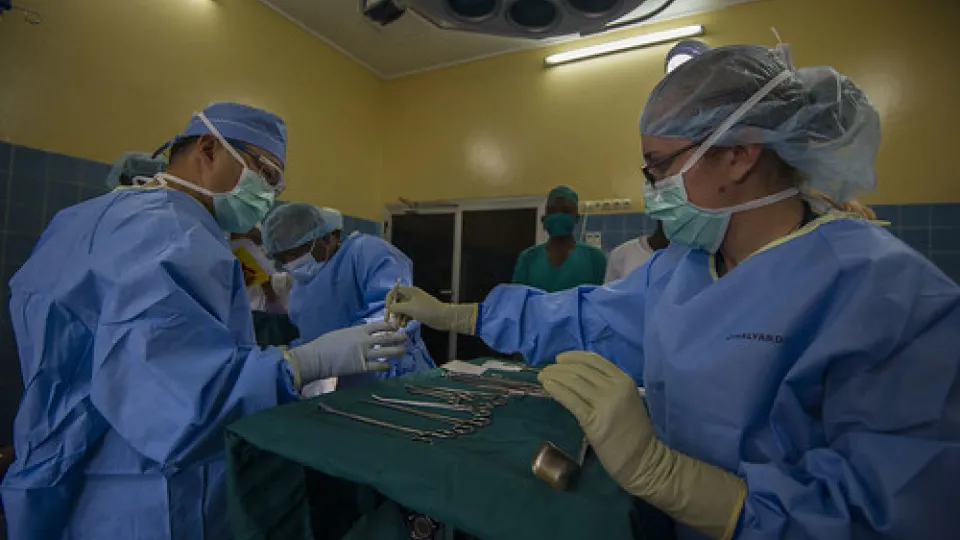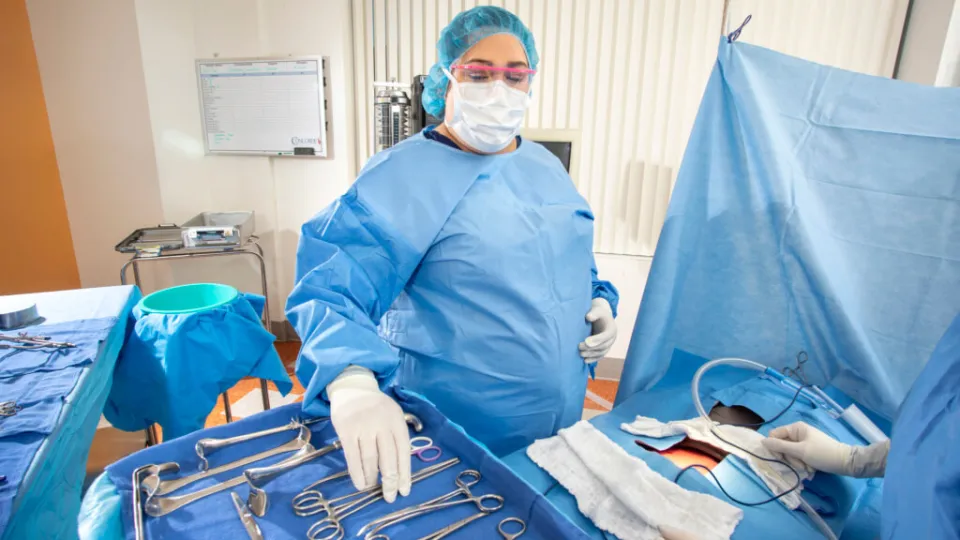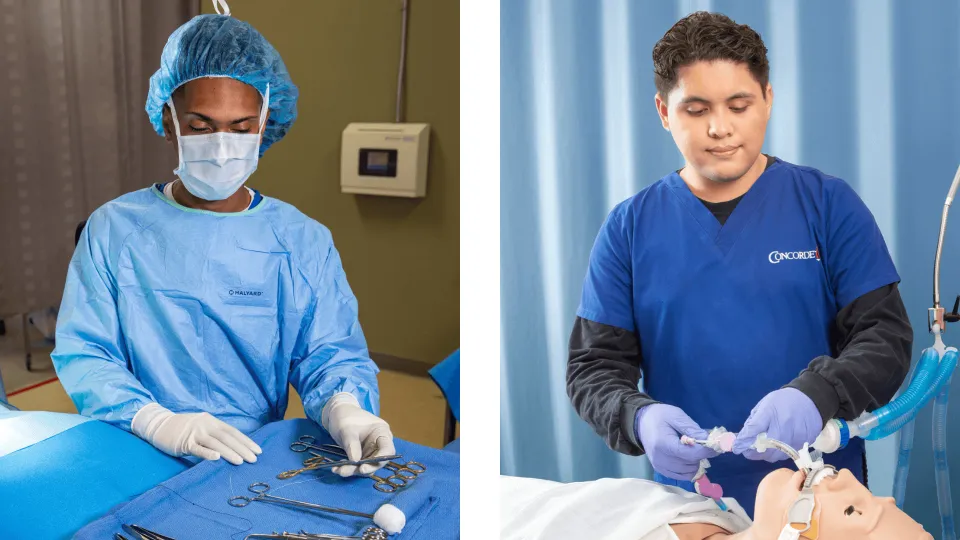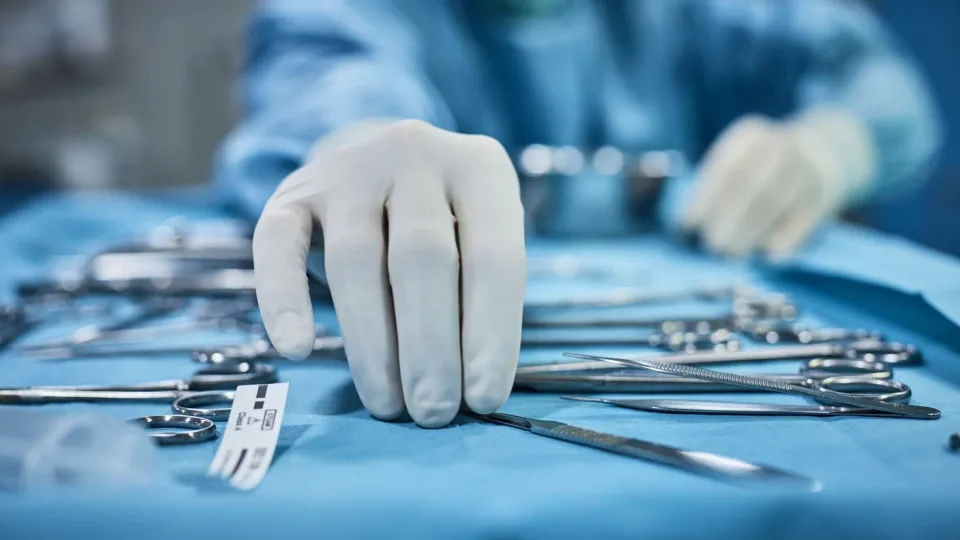
Also called a surgical or scrub technician, a surgical technologist is a skilled professional who ensures that the operating procedures go smoothly by preparing the room and patient, passing instruments to the surgeon, and transporting patients to and from the room. Although there are some skills you can learn through an educational program, there are several key character traits that can help you become successful as a surgical technologist.
What Does a Surgical Technologist Do?
A surgical technologist works as a member of the surgical team, helping surgeons, operating room nurses, anesthesia providers, and other health care professionals to give a surgical patient safe care. They have experience assisting surgeons during both major and minor surgical procedures. These technologists assist during the three phases of surgical patient care: preoperative (before surgery), intraoperative (during surgery), and postoperative (after surgery). Unlike the surgeon, the technologist is the first to enter the operating room and the last to leave.
What Does a Surgical Technologist's typical day look like?
Some of their duties include the following:
- Sterilize equipment.
- Prepare operating rooms for surgery.
- Get patients ready for surgery.
- Assist surgeons during surgery.
- Count surgical instruments.
- Maintain a sterile environment.
Before the operation begins, the surgical technologist prepares the operating room by sterilizing and setting up the equipment. They then bring patients into the room and get them ready for surgery by positioning them on the bed and preparing the incision site. During the operation, they pass sterile instruments to surgeons and hold internal organs in place. They might also handle specimens that are needed for laboratory analysis. Once the operation is over, they apply bandages to the incision site and transfer the patient to the recovery room.
What Character Traits Do Surgical Technologists Need?
To be a successful surgical technologist, several character traits might help you become successful.
Active Listening Skills
Perhaps one of the most important skills you can have as a surgical technologist is the ability to listen and follow directions. Surgery is a life-or-death situation, and communication is essential in the operating room. One misunderstanding or misinterpretation in the operating room can have dire consequences. You must feel comfortable communicating clearly with the surgeon, understanding what they are saying, and concisely answering any questions. You should also know how to read the room and understand when it's appropriate to speak and when it's best to wait to ask a question.
Over time, you will become more familiar with specific surgeons as well as the different types of surgery. This is helpful because it allows you to anticipate the needs of the medical team and patient. Although this doesn't replace the need to have strong listening skills, it can allow you to be better prepared for everyone's needs. You might also need to directly communicate with the patients and their families, so you need to know how to interact with them.
Good With Technology
Surgeries involve a lot of machinery, so it's beneficial if you're comfortable working with machines. Surgical technologists often manage several types of machinery, including electrosurgical and electrocautery equipment, medical staplers, and argon beam coagulators. Even if you're not familiar with these types of equipment, you will receive training on how to operate them.
When you're not in the operating room, you might be tasked with updating patient records and managing spreadsheets. Having a basic knowledge of certain software programs is beneficial in this profession.
Manual Dexterity
It's imperative to have steady hand-eye coordination when you work as a surgical technologist. A large portion of the job involves you passing items from your hand to the surgeon, and the last thing you want to have happen is to drop the instrument or puncture the surgeon's glove. You also will be picking up instruments and handling sharp objects.
Patience
Not every experience in the operating room will be positive. You might experience situations where the other team members don't speak to you in a complimentary tone. The stress of the environment might cause people to speak some unkind words. You need to be able to withstand the pressure of the moment, no matter what. You need to avoid taking things personally and to learn from these moments. If necessary, you will gain the expertise to defuse a similar situation in the future.
Detail-Oriented
Attention to detail is one of the top priorities in an operating room. Each operation requires dozens of different technologies and skills as well as hundreds of pieces of equipment. A single mistake can have a huge impact on the surgery's outcome. A surgical technologist's job involves paying close attention before, during, and after surgery. You must keep track of the number of instruments used and ensure proper sterilization. When the surgeon asks for a specific instrument, you need to know which one to hand over.
Throughout the surgery, you also need to keep track of each instrument to make sure nothing remains inside the patient. You should also know the surgeon's mannerisms and anticipate what the surgeon needs before being asked. With experience, you can begin to anticipate what might happen next during the operation, which can make you an asset to the team. Beyond attention to instruments and the surgeon's demands, surgical technologists must also know about practices and procedures that can reduce the risk of infection and contamination from pathogens.
Calm Nature
Being a surgical technologist requires you to work well under pressure, especially under tense situations. Even the most routine procedure can quickly turn into a matter of life or death if complications arise. Responding in frustration or fear will only exacerbate the situation. If you act nervous, that energy can pass along to others in the operating room and make mistakes more common.
You must remain calm and focused, no matter how simple or complex a procedure is. It's vital to keep your emotions in check and stay focused. That doesn't mean that you don't have emotions; rather, it means that you rely on logic rather and emotion when making decisions.
Grounded
Every aspect of a surgical technologist's job requires you to be grounded and logical. You cannot think that you're better than anyone else or that your tasks aren't necessary. Someone is responsible for counting the instruments used after each layer closure to make sure that nothing is left inside the patient. Counting these items is crucial because anything left inside the patient can cause complications or even death.
Team Player
There's a reason why the staff who work in an operating room is called the surgical team. Everyone has their own role to perform, yet they must all work together to make sure the patient receives the highest level of care. You might help surgeons, nurses, radiologists, and anesthesiologists. All of these professionals will depend on your ability to collaborate with others. You will also be expected to respond quickly and accurately to whatever requests they make. A successful surgical team works in sync with each other.
Flexibility
As mentioned, it's important for a surgical technologist to be attentive to the needs of the other members of the team. It's also up to you to be alert and predict what might happen next in the surgical room. One minute, things might be going just fine, but then the atmosphere might shift completely without notice. You need to stay on your toes and be ready at a moment's notice if things suddenly change. When unexpected situations occur, you have to adapt calmly and professionally.
Empathetic
All quality health care professionals should possess a great deal of empathy, compassion, and sympathy. These characteristics can help them thrive in their profession as it shows how much they care. As a surgical technologist, you should never forget that the person in the operating room is more than just a patient. That person is someone's family member and friend, and it's up to you and the rest of the surgical team to provide the patient with the utmost care and compassion.
Good Physical Stamina
Surgical technologists spend the majority of their day on their feet, so it's very important that you can stand for long periods of time without a break since some surgeries can take hours to complete. You may be called into emergencies where you need to work long shifts. It's imperative that you can remain focused and keep your mind on the situation instead of your own physical or mental fatigue. You will also be responsible for transporting patients to and from the operating room. While in the operating room, you might also be asked to move an unconscious patient.
What Is the Work Environment for Surgical Technologists?
According to the U.S. Bureau of Labor Statistics (BLS), in 2019, 73% of surgical technologists were employed by local, state, and private hospitals (1). They work in a clean and cool environment, standing or sitting close to other team members. Since surgeries occur almost daily and at any time, you might need to work nights, weekends, and holidays. Their job is physically demanding, requiring them to stay alert and stand for long periods of time. They may also be exposed to communicable diseases as well as unpleasant sights, smells, and materials.
What Is the Job Outlook for Surgical Technologists?
The BLS states that the job outlook for surgical technologists is expected to grow faster than average when compared to other occupations. From 2019 through 2029, employment is expected to increase by 7%. Also, in 2021, U.S. News and World Report reported that surgical technologists have the 24th best health care support job (2). This increase is due to advances in medical technology that makes surgery safer as well as an increase in operations to treat a variety of injuries and illnesses.
Another contributing factor to this good job outlook is the aging baby-boom generation requiring more surgeries. This generation might be more willing to seek medical care to improve their quality of life compared to previous generations. For instance, an older person might want a knee replacement surgery to maintain an active lifestyle.
How Can You Train to Become a Surgical Technologist?
The path to becoming a surgical technologist involves education, hands-on experience, and certification. It's imperative to complete all aspects before you begin your career.
Education
To become a surgical technologist, you need to enroll in a surgical technologist program. These programs typically last 16 months to a year, depending on the school and program. Courses cover human anatomy and physiology, microbiology, and patient care.
Experience
During and after you attend the surgical technologist program, you will need to complete a specific number of practice hours. Most programs will provide you with an opportunity to develop and apply the fundamental surgical assisting skills through practice. You also will learn how to recognize the needs of your patients and demonstrate professional responsibility.
Licenses and Certification
Although it's not mandatory, obtaining licensure and certification might help you secure a job as a surgical technologist. Professional licensure and certification requirements vary by state. The National Board of Surgical Technology and Surgical Assisting provides certification as a Certified Surgical Technologist. To obtain this certification, you typically need to complete an education program and pass an exam.
Another option is through the National Center for Competency Testing, which issues the title of Tech in Surgery -- Certified TS-C. You can qualify for this certification through an education program or work experience. You also need to document your critical skills and pass an exam. Both certifications require you to complete continuing education programs to maintain certifications. Some jobs also state that you must have certification in CPR, basic life skills, or both.
What Can Concorde Do for You?
If you're interested training to pursue a career as a surgical technologist, Concorde can help you achieve your goals. Our Surgical Technology programs can be completed in as little as 16 months. Our program is designed to give you the training and experience you need to pursue a career as a surgical technologist. Get started at Concorde, and you can train to get started in a career as a surgical technologist in as few as 16 months.
Interested In How To Become a Surgical Tech?
Click here to explore Surgical Technology Programs near you!
Footnotes:
"Surgical Technologists," U.S. Bureau of Labor Statistics, https://www.bls.gov/ooh/healthcare/surgical-technologists.htm#tab-3.
"Surgical Technologist Overview," U.S. News and World Report, https://money.usnews.com/careers/best-jobs/surgical-technologist.
"Image", US Army Africa, https://www.flickr.com/photos/usarmyafrica/35632529554/sizes/m/
Take The Next Step Towards a Brighter Future
Interested in learning more about our Surgical Technology program?
We have a Concorde representative ready to talk about what matters most to you. Get answers about start dates, curriculum, financial aid, scholarships and more!







